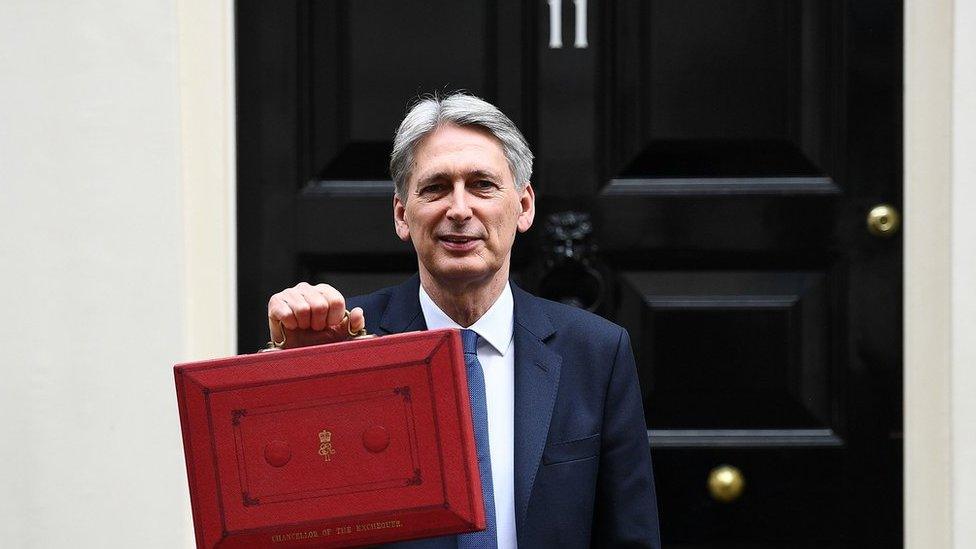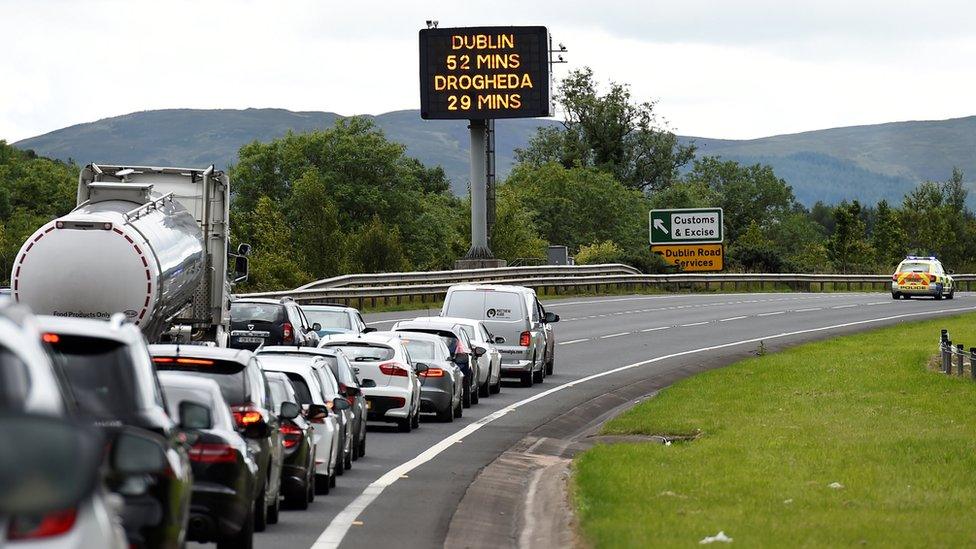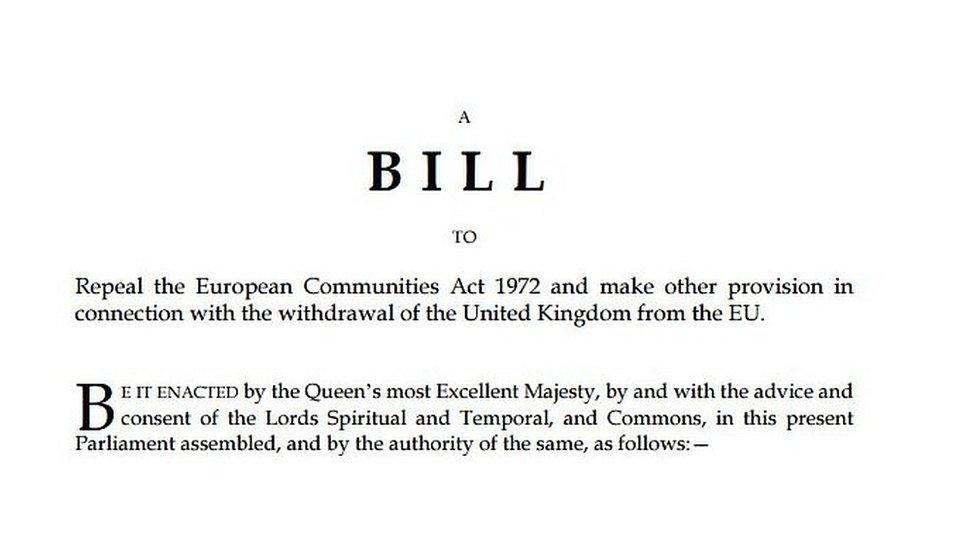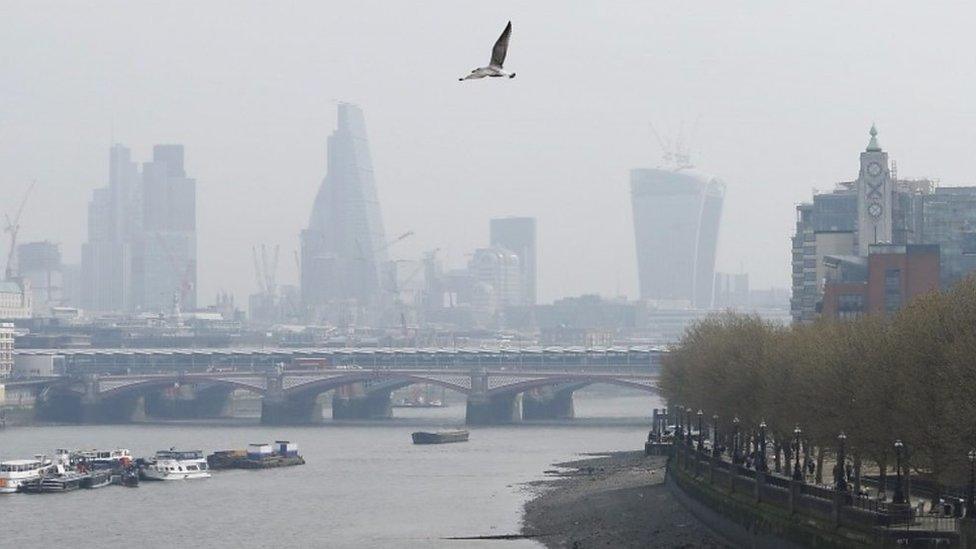Week ahead in Parliament
- Published
- comments

For a week or so, even Brexit is eclipsed by the Budget.
It is a moment of huge pressure on the Chancellor - and not just for the usual economic reasons - because the Tory troops will be looking for a financial package that injects new vigour and purpose into the government after a dangerously shaky interlude.
The question is whether Philip Hammond can deliver without losing control of government borrowing.
Remember that a number of recent budgets have run into real parliamentary trouble - remember George Osborne's Omnishambles Budget, the Pasty Tax, the Tax Credits fiasco, or Mr Hammond's travails over NICs?
The government's general weakness and the targeting of the Chancellor by his political rivals have created an environment in which any measure in his Budget could suddenly become a serious vulnerability.
It doesn't look like there will be major votes on the EU (Withdrawal) Bill (see below) but keep an eye out for government concessions over issues due to surface later in the debate, like their proposed amendment to specify the precise date and time of Brexit.
Away from the chamber, watch out for the publication by the Work and Pensions and BEIS committees of a bill to go with their latest report "A framework for modern employment" on the gig economy and the need to sort out the law on self-employment.
'm told its proposals will be very strong and worker-friendly and were agreed without dissent by the two committees. The two chairs, Rachel Reeves and Frank Field, have been lobbying for legislation and have asked the prime minister for parliamentary time to introduce their own bill, if the government is too busy with other matters.
Here's my rundown of the Westminster week ahead:
Monday
The Commons opens (2.30 pm) with Home Office questions - and after an hour of those, expect the usual post weekend crop of ministerial statements and urgent questions.
The main event is a Ways and Means Resolution for the Taxation (Cross-Border) Trade Bill, which is intended to allow the UK to operate a standalone customs, VAT and excise system after Brexit.
This is a lot more interesting than it sounds. Ways and Means Resolutions are the device by which Parliament authorises taxes - in a budget the Chairman of Ways and Means, currently Lindsay Hoyle is presented with an envelope of these resolutions, which are put to the House - some almost immediately, to authorise rises in alcohol and tobacco duties, for example.
The resolutions set out the tax changes the government proposes, and in this case the government is tooling up to make what could quite possibly be major changes to VAT and other duties on Brexit Day.
A key point is how this will apply across the Irish border. The government has said it hopes to avoid physical border, but agreement has yet been reached with the EU about how this can be achieved. Expect a bit of DUP probing in this debate.

Agreement has yet been reached with the EU about the border
At the moment, of course, VAT is largely shaped by Brussels, but this measure could equip ministers to change the pattern of the tax, and zero rate things that cannot be zero-rated at the moment... they might (and this is me speculating) vary, or remove altogether, the current 5% rate on domestic fuel.
And similarly the bill will also allow the government to set tariffs for cross-border trade, which could be very significant, in the absence of trade deals with particular countries, or with the EU.
The adjournment debate, led by the former Education Secretary, Nicky Morgan, now chair of the Treasury Committee, is on Companies House and transgender persons - this is part of her longstanding campaign to ensure that documentation of companies does not "out" transgendered people against their will.
In March, she presented a private member's bill to give transgender persons the right to demand that Companies House withhold their personal information from the public record, preventing details about a director's former name being disclosed, if the individual's transition and personal would be revealed to people searching the Register of Directors.
In Westminster Hall (4.30pm) there is a debate on two e-petitions on the TV Licence fee, external. The first, e-petition 170931, says: "I believe the TV licence should be abolished, removed and not a legal requirement. It should be included through your provider for free. TV is expensive enough without the added extra worry of £130+ a year." It was signed by 125,958 people.
The second e-petition 200239 says: "The TV Licence is no longer fit for purpose and should be abolished. It is unfair that one should hold one to watch Freeview channels or indeed subscription TV. The BBC should look at alternative methods of funding particularly as it is commonly felt there is a high level of bias." This received 12,762 signatures.
In the Lords (2.30 pm) the first business is the introduction of a new peer - Lord Burnett of Maldon, the Lord Chief Justice of England and Wales.
Question time covers the impact on tourism of the UK's leaving the EU Open Skies Agreement, whether prefab housing could help fix the housing market, VAT evasion by overseas sellers trading online in the UK, and the number of company start-ups in 2016.
Then peers return to the detail of the Data Protection Bill in their fifth committee stage day - they will be debating Clauses 112-148 which deal with the role of the Information Commissioner and enforcement powers.
There will also be a short debate on the operation of the Memorandum of Understanding with the devolved administrations - led by the UUP's Lord Empey.
Tuesday
The Commons opens (11.30am) with Foreign Office questions, after which (assuming no statements or urgent questions) the Conservative, Huw Merriman, a member of the Transport Select Committee, presents a Ten Minute Rule Bill on Automatic Travel Compensation - this would deliver automated delay-repay compensation for flights, rail journeys and other forms of transport.
Then MPs move on the third committee stage day of debate on the European Union (Withdrawal) Bill.
While there are several Dominic Grieve amendments down for debate, and they have been signed by enough Conservative MPs to look threatening to the government, I'm not sure they will be pushed to a vote.

This section of committee stage centres around the European Charter of Fundamental Rights, and there are a variety of amendments intended to make sure that the rights it sets out are not lost, post Brexit.
But at this stage, the Tory backbenchers, in a rather House of Lords-like way, want to hear a response from the government (in the form of Solicitor General Robert Buckland) rather than stage a rebellion; if they're not happy, they might have a go when the debate reaches report stage.
If they do force a vote, it would mark a real escalation in hostilities with their own leadership.
In Westminster Hall, the debates range across UK amphibious capability in the 21st century (9.30am-11am) and the state pension age (4.30pm-5.30pm).
My eye was caught by a Brexit-related debate on the future of medicines regulation (2.30pm-4pm). This is led by Labour's Helen Goodman, who says life sciences and pharmaceuticals employ thousands of people, spend millions on R&D and generate a £3bn trade surplus for the UK. But she is concerned about the future regulation of medicines, because it is not clear if the UK will stay in the European Medicines Agency.
My committee pick (9.30am) is the Home Affairs hearing on post-Brexit immigration services with Immigration Minister Brandon Lewis. The focus will be on arrangements for an increased workload, post-Brexit.
In the Lords, business begins (2.30 pm) with the introduction of another new peer. But in this case it's a familiar figure, Lord Chartres - the former Bishop of London, Richard Chartres - who was on the Bishops' Benches for 20 years. His main areas of interest were climate change, heritage and historic buildings, and Russia (he's an expert on the Russian Orthodox Church and has many links).
After that, question time covers the possibility of legislation to control the use of drones, human rights in Indian-held Kashmir, and the target number for additional social homes to be built by 2022.
The third reading of the Financial Guidance and Claims Bill is not quite the usual rubber-stamping exercise: a government amendment promised on a "breathing space" for people in financial difficulty. Labour peers were asked to be on stand-by in case a vote was held.
That is followed by the first day of detailed committee stage scrutiny of the Sanctions and Anti-Money Laundering Bill. Peers will be focusing on Clauses 1-40, which deal with such matters as sanctions regulation and court reviews - and the debate may be rather spiced up by the latest report from the Lords Constitution Committee, external which has warned that the bill contains "inappropriately broad powers for ministers".
The committee's verdicts are taken extremely seriously by peers, and can swing support behind amendments if ministers fail to take their recommendations on board.
Wednesday
In the Commons (11.30am) it's question time for the ministers in the Cabinet Office and Chancellor of the Duchy of Lancaster - before the weekly delights of Prime Minister's Question Time, at noon.
But the main event will be the Budget delivered by the Chancellor, Philip Hammond. One nuance to watch out for is a possible nod to the Scottish Tories - with the announcement of some goodies for Scotland, prompted by their lobbying, and quite possibly not routed through the SNP government in Holyrood.

A seizure of 'skunk' cannabis
In Westminster Hall, the debate on the roll-out of broadband to rural communities in Scotland has important devolution overtones - although it is a national policy issue, implementation is passed to local authorities in England and the Scottish government in Scotland, and Scottish Conservative John Lamont wants to make what he says is slow progress to providing an essential service an issue about the competence of the SNP administration(9.30am-11am).
Another debate to catch my eye was the Conservative Craig Mackinlay's on the human and financial costs of drug addiction (2.30pm-4pm). He chairs the All-Party Parliamentary Group on Cannabis: Harmful effects on developing brains, and he wants to put on public record the costs, human and financial of drug addiction in the UK. "The effects of Skunk cannabis on youngsters is increasingly being recognised as is the additional human cost - a significant rise in traffic related deaths in Colorado following decriminalisation."
He also wants to highlight the record the level of Opioid deaths in the United States - 65,000 in 2016.
On the committee corridor, look out for the Work and Pensions hearing (9.30 am) on medical assessments for disability benefits. The contractors, ATOS, Capita and Maximus, have been criticised for their handling of PIP and ESA assessments - both on the treatment of claimants and on the verdicts they have reached on fitness for work. There has been a huge response to the committee's call for evidence and today MPs will hear the experiences of five claimants, and take evidence from welfare advisers from a series of advice groups.
In the Lords (3pm) question time covers planning for delay-free border crossings between the UK and EU after Brexit, the Social Mobility Commission's 'State of the Nation' report and collection of recycled materials.
Then peers return to the detail of the Data Protection Bill - focusing on clauses 149-179 which cover Enforcement, Supplementary and Final Provisions.
There will also be a short debate on improving the standard of wound care in the NHS - led by Labour's Lord Hunt of Kings Heath.
Thursday
The Commons meets at 9.30am for half an hour of International Trade questions, followed by half an hour of Women and Equalities questions. There will also be the weekly statement on forthcoming Commons business.
And then MPs will move on to the next phase of the Budget debate - the themes for each day of the Budget debate are announced on Budget day.
The adjournment debate, led by the Conservative, Iain Stewart, is on the 1979 same roof rule for familial sexual abuse cases.
This is part of the Criminal Injuries Compensation Scheme. Campaigners say it treats those victims who were abused before 1 October 1979 less favourably than those who were subjected to abuse after that date. This is the point at which the rules were changed to allow for awards involving intra-family violence. Before that, compensation awards were not possible where the victim and offender were living together as members of the same family.

Sadiq Khan will be questioned about attempts to improve London's air quality
The hot new committee corridor trend for joint working will see the Environment Food and Rural Affairs, Health, Transport and Environmental Audit committees join forces for an inquiry into air quality (9.45pm).
Their first hearing will host witnesses from the environmental law firm, ClientEarth, the Medical Research Council, and the European Environment Agency, culminating in an appearance by the Mayor of London, Sadiq Khan.
In the Lords (11am), questions to ministers cover devolution post Brexit, alcohol abuse in England and the long-term needs of the Rohingya refugees in Bangladesh - that last is from the former International Development minister Lord Foulkes of Cumnock, a recent visitor to the refugee camps.
The main debates are on subjects chosen by Labour backbenchers, starting with maintaining UK defence forces at a sufficient level to contribute to global peace, stability and security - led by Lord Soley. This has attracted a pretty decent speakers list - including such luminaries as Lord Boyce (former Admiral of the Fleet, Chief of the Defence Staff and First Sea Lord); Lord Craig of Radley (Air Marshal and former Chief of the Defence Staff); the former Foreign Secretary, Lord Owen, and Labour's sea-going peer, Lord West of Spithead.
The second debate is on the challenges facing problem gamblers, online gambling and the Multi-Operator Self Exclusion Scheme and the third on reviewing section 42 of the Armed Forces Act 2006.
Friday
The Commons is not sitting, but in the Lords, peers will be debating private members bills, starting (10am) with Equality Act 2010 (Amendment) (Disabled Access) Bill from Lord Blencathra.
This is a bill to amend the Equality Act 2010 to improve access to public buildings by introducing six-inch and 12-inch rules for step-free access. Speakers already include several members of the Lords "disability bench," including Baroness Masham, Baroness Thomas of Winchester and Baroness Brinton.
Then comes the second reading of the Home Education (Duty of Local Authorities) Bill from the Labour peer, Lord Soley. This will require local councils to monitor the educational, physical and emotional development of children receiving elective home education.
Lord Soley argues that many parents take their child or children out of school for home education because they feel that the school is not giving their child the education that they think is necessary - including parents who have had a bad experience of the special needs service.
But he is concerned that, in the process, some children do not get the basic education necessary to cope in the modern world. He is also worried that abusive parents are now more aware of scrutiny, and home education can allow them to 'hide' the child.
Third is the second reading of the homelessness campaigner Lord Bird's Creditworthiness Assessment Bill - assessing people's ability to pay a mortgage take into account rental payment history and council tax payment history.